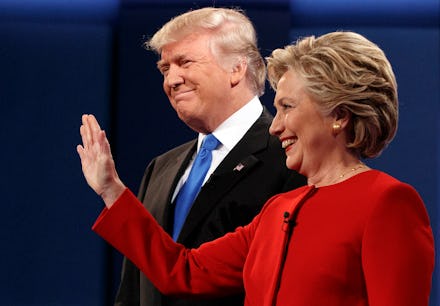What to expect from Clinton and Trump in the second debate, based on the first

Going into the first presidential debate Monday night, no one knew what to expect. Donald Trump's unpredictability made forecasting the outcome a guessing game.
Would the Trump of the Republican primary debates show up and become unglued? Or would a new, more scripted, prepared Trump emerge onstage and surpass rock-bottom expectations?
It quickly became clear that the Trump onstage Monday night Hofstra University in Hempstead, New York, had not changed. After maintaining some semblance of composure for the first few minutes, the GOP nominee fell back into his old habits: interrupting his opponent, telling bald-faced lies and blaming everyone but himself for his poor performance.
Democratic nominee Hillary Clinton, on the other hand, came across as prepared, calm and in command of the stage. She successfully set trap after trap for Trump which he dutifully walked into.
Perhaps it should not have been surprising that Trump demonstrated no change in attitude or demeanor in the first presidential debate. While his most recent fleet of senior campaign staff might now be running a more disciplined operation, the candidate remains the same.
But what does the first debate tell us about what to expect in the second showdown?
Scheduled for Sunday, Oct. 9 in St. Louis, the second debate will be one of the final opportunities for either candidate to change the fundamental dynamics of the race. Hosted by Martha Raddatz of ABC News, the contest will focus on foreign affairs, and viewers will be able to vote on some of the questions to be asked.
Based on what we saw Monday, here's what we can expect from both candidates in the next debate (assuming Trump shows up).
Expect Clinton to keep laying traps for Trump — and Trump to keep falling into them.
Clinton's reference to Trump's mocking of former Miss Universe contestant Alicia Machado's weight was perhaps her most effective maneuver, and provides a blueprint for how Clinton will engage Trump in future debates.
The moment came toward the end of the debate, as Clinton interjected before the final question to raise the issue of Trump's treatment of women.
"One of the worst things he said was about a woman in a beauty contest," she said. "He loves beauty contests, supporting them and hanging around them. And he called this woman 'Miss Piggy.' Then he called her 'Miss Housekeeping,' because she was Latina. Donald, she has a name."
Trump, incredulous, demanded of Clinton, "Where did you find this? Where did you find this?" Clinton then named Machado, who Clinton said planned to vote in November.
Trump couldn't help but take the bait and continued digging a hole on Tuesday morning, again insulting Machado over her weight.
"She was the worst we ever had," Trump said Tuesday on Fox News, breathing new life into the story. "She was the winner and, you know, she gained a massive amount of weight. It was a real problem."
Clinton and her campaign teed this moment up, knowing Trump couldn't resist engaging and further damage his standing among women. The Clinton campaign quickly released a devastating video of Machado speaking about her experience with Trump shortly after the debate ended:
On Tuesday afternoon, the campaign arranged a call with Machado for reporters, in which she answered questions about her treatment in the Miss Universe pageant.
So, in short, Clinton deliberately brought up Machado's story during the debate to provoke Trump. Trump fell for it, then insulted Machado the next morning. The Clinton campaign parlayed both instances into a web video and media blitz the day after the debate.
Expect this level of preparedness and coordinated assault during and following the next debate.
And expect Trump to fall for it. If Trump were anyone else and had even a degree of discipline, he would hunker down and memorize three to four points to hammer away at on the range of foreign policy issues that are bound to come up in the St. Louis debate.
That appears unlikely. Trump's reaction to the first debate was not to initiate a measured process to reflect and improve his performance. His response was instead to blame the microphone, which he claimed was faulty with no evidence. He tweeted out phony online polls showing he won. He's not going to change.
If anything, he might lash out further. He told Fox News that he might "hit her harder" in subsequent encounters, alluding to his decision not to bring up "the many affairs that Bill Clinton had."
This is not to say Clinton is certain to win the second debate. Far from it — in Hofstra, she was not challenged forcefully on the issues where she is weakest, namely her use of a private email server, the activities of the Clinton Foundation and her response to the 2012 terrorist attack in Benghazi, Libya. If either the moderator or Trump or both level successful critiques in those areas, viewers could come across as seeing both candidates as equally flawed.
If Clinton turns in a performance in St. Louis similar to the one she delivered in Hofstra, and handles challenging questions gracefully, she will win. If Trump again shows up unprepared and falls prey to Clinton's attempts at getting him to overreact, he'll lose.